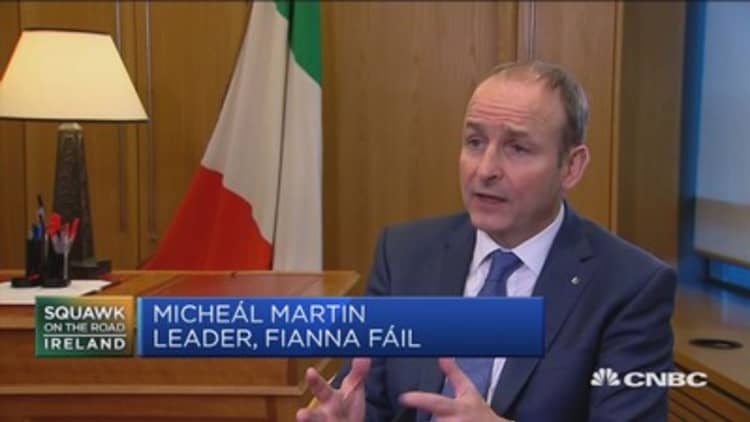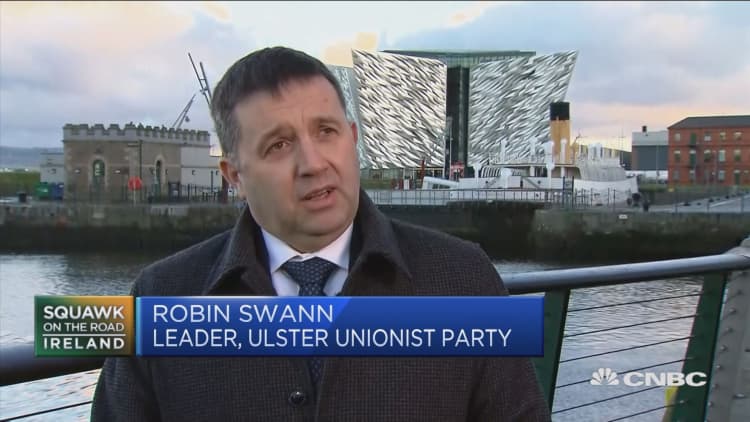
The leader of prominent Irish political party Fianna Fail is optimistic that upcoming Brexit talks will produce some sort of proposal for Ireland regarding its northern border. This marks a starkly different attitude from many other European Union member states and certainly many other Irish politicians.
"I think something will come through. I mean, my sense is that there will be progress made. Whether it will constitute a breakthrough or not, I'm not sure yet," Fianna Fail leader Micheal Martin told CNBC on Wednesday. "But I know the mood is a bit better than it was two or three weeks ago."
Fianna Fail is one of Ireland's top two political parties, and its support has been key to the survival of the minority government of Fine Gael, the party currently heading Ireland's government and to which Prime Minister Leo Varadkar belongs. Both parties are center-right and have their roots in the Irish Civil War.
Ireland's government and the EU have made it clear they want specific answers on the Irish border question in the coming days. The border issue separating Ireland from the U.K.'s Northern Irish province has emerged as one of the most intractable flashpoints of the Brexit debate: after 20 years of open borders and trade following the 1998 Good Friday Agreement, which ended the sectarian conflict between Northern Ireland and the Irish Republic, the U.K. wants to take Northern Ireland out of the EU customs union. Many fear this will mandate the reimposition of a hard border.

On whether U.K. Prime Minister Theresa May's embattled government in London can provide solutions to these concerns, Martin told CNBC, "I think they can deliver some, I do. And they're going to have to work for them.
"We met with (U.K. Foreign Secretary) Boris Johnson some weeks ago, and the British government position up to then was 'trust us'," Martin continued. "Now that's not a base I accept, and I agree with the Irish government on this, and with Leo Varadkar that we cannot just go in blind to the next phase without some clear indication as to the pathway in relation to the border of north and south on the island of Ireland. That's very, very important."
Divided inside, united outside
After a tense week of political gridlock over the future leadership of deputy prime minister Frances Fitzgerald, a Fine Gael official whose past in politics recently came under intense scrutiny, partisan relations in the Irish government are at a low.
Fitzgerald resigned on Tuesday under pressure from both the opposition and her own party, and Varadkar came out of several days of negotiations (which were aimed at protecting Fitzgerald's position) appearing politically weaker.

Asked if he had trust in Varadkar after their days of talks, Martin replied: "I think actually in the midst of the crisis, through our discussions, we reached better understandings. But there is no doubt that emotions in both parties are bruised.
"But, that said, I think we are clear in terms of the immediate challenge ahead in both domestic issues and in terms of Brexit. And I think we both learned a lot from this particular episode, and that is the key."
On whether he stood with the prime minister's perceived hardline approach to Brexit talks and the border question, he said emphatically: "Oh we will of course. The Irish Parliament is at one on this absolutely at one on this. This is an important moment for us."
While fractured internally, Ireland's political parties appear united in wanting Northern Ireland to remain in the EU customs union.
Martin cited economic concerns when it came to the threat to the customs union, which has for decades allowed tariff-free and seamless trade between the U.K. and Ireland.
"It will mean costs, because we're at the border, on our industries as well, and on our small and medium-sized enterprises (SMEs). So, we're very very worried about it, to be honest."
'There was no blueprint'
"There was no blueprint for Brexit. And nobody had a roadmap. I think that's probably the greatest failing of the entire initiative," Martin stressed. "Before we make a decision of that seismic scale, you should really do far more due diligence and work out what actually will mean. We're all grappling with it."
Martin told CNBC he has put forward a proposal similar to the customs union, which would make Northern Ireland a "special economic zone that would have regulatory convergence with the European Union's customs union and single market."

On what he thinks his government can do to limit Brexit damage, Martin replied: "Working with partners in the EU. Try and persuade Britain to have a deal that's as close as possible to the existing Customs Union and single market, essentially a regulatory convergence in terms of standards and so on, that means we can trade on a continuing basis."
Ireland's government narrowly averted collapse this week, when deputy prime minister and Fine Gael member Frances Fitzgerald stepped down under pressure from Martin's party. Fianna Fail had tabled a motion of no confidence against her over alleged misconduct in a 2015 whistleblower case.
Had she not voluntarily resigned, a successful no-confidence vote would have triggered new snap elections before Christmas, effectively dooming Varadkar's leadership. The resignation, which followed days of talks between Martin and the prime minister, was seen as a victory for Martin.



